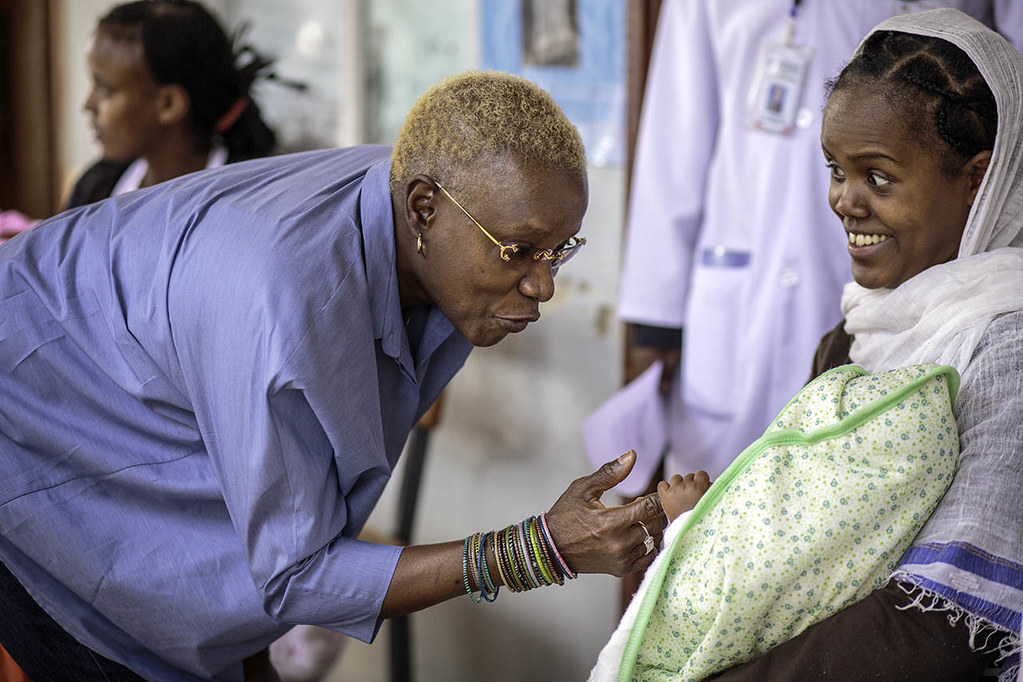Angelique Kidjo – Every year 128,000 babies in Africa alone die before their first birthday, victims to a disease that is entirely preventable. Death through tetanus is forcing mothers everywhere in Africa to watch their babies die because the required medication is unavailable to them and the hospitals are too far away.
Pampers and UNICEF have joined forces for the 4th year in the fight against newborn tetanus, with the “Give the Gift of Life” campaign in conjunction with Angelique Kidjo.
Grammy Award winner, mother of one, Angelique may be small in stature but a dynamo of passion and frustration fires up when talking about these baby deaths.
“I have held dying children in my arms and listened to the weeping of mothers who have lost their new born sons and daughters to a disease that is merciless and cruel and yet completely preventable.
“I was born in Western Africa and have first hand experience of UNICEF’s immunisation programmes. Who is to say if it hadn’t been for them that I would be here today, lending my support otherwise? It is a subject so close to my heart it pains and angers me all at once. You can only understand loss when you have experienced it but as a mother, just the suggestion of something terrible befalling your children is sure to send shivers down your spine.
“I have been a UNICEF goodwill Ambassador since 2002 and I recently accompanied UNICEF and Pampers to Haiti where I was able to see the positive impact of the vaccination programme and how it is directly helping women and their babies.
“As a child, I saw the impact of this devastating disease, and so understand the ultimate importance of MNT vaccination for saving lives. It is heartbreaking to know that this disease is still taking the lives of so many each year in less industrialised nations, despite the fact that it is entirely preventable through an inexpensive vaccination.”
Maternal and newborn tetanus comes from bacteria liiving on dead and decaying matter in soil, animal dung and faeces.
Newborn (Neonatal) tetanus occurs when newborns are infected as a direct result of unhygienic birthing practices, such as cutting the umbilical cord with instruments that haven’t been sterilized, handling it with dirty hands or treating it with contaminated dressings and traditional substances such as ghee (butter), cow dung, ashes and mud. Mothers can be infected with maternal tetanus during an unsafe or unsanitary delivery.
When the bacteria enter an open wound they begin to work as a nerve toxin (poison), affecting the central nervous system and causing painful and uncontrolled muscle spasms. Tetanus can cause one of the most painful deaths known to man. Anyone can contract maternal and newborn tetanus if they are not vaccinated; however, it is usually newborns and women in remote rural areas without access to antenatal care or immunisation that become infected.
Once contracted maternal and newborn tetanus have no real cure. In rural areas of less industrialised countries where health infrastructure is very limited, almost all infants infected die. Even today over 95% of the babies that suffer from newborn tetanus and who have no access to treatment facilities will die.
Newborn tetanus strikes rapidly. A newborn infected with tetanus may appear perfectly healthy but the symptoms usually appear from three days after the birth, when the baby’s jaw and facial muscles may tighten due to the tetanus poison. The baby’s mouth will continue to grow more rigid so that it becomes “locked” (thus the name “lockjaw” given to tetanus) and the newborn will no longer be able to breastfeed.
The newborn’s body may stiffen or arch and he or she may convulse when stimulated by light, sound or being touched. Finally, the newborn may no longer be able to breathe and will die.
Angelique looks at me with a cool stare but there is sadness in her eyes as she speaks.
“Maternal and newborn tetanus are completely preventable through immunisation and hygienic birth practices. Tetanus Toxoid (TT) is a safe and inexpensive vaccine that not only protects women of childbearing age against maternal tetanus for three years but also passes on protection through maternal antibodies via the placenta to their babies. The simple administration of two doses of the tetanus vaccine will protect the woman and any baby born to this woman during a 3 year period.”
“It saddens me to think that Africa remains the sick continent of the world. In Europe and other industrialised countries thanks to now-routine immunisations, tetanus is no longer a threat and is considered a disease of the past. However, the disease remains endemic and continues to kill in developing countries throughout the world.”
In an effort to bring this situation to the attention of more people, Angelique has written a specially-commissioned song that encapsulates the hope surrounding the new “Give the Gift of Life” campaign.
“Mothers around the world can make a difference by raising awareness of this terrible disease through the universal power of music. Together we can unite in helping to eliminate maternal and newborn tetanus.
For every free download of the song at pampers.com or unicef.org, Pampers will make a donation to help UNICEF deliver MNT vaccination programmes. “You Can Count on Me” is an emotional and unforgettable song, synonymous with the 2009 Pampers UNICEF campaign, that will resonate with mums so much that they will want to download it for themselves and also tell other mums about it.
To make a donation to help Pampers and UNICEF reach more children around the world or for further information about the campaign please visit www.pampers.com or www.unicef.org.
Since the start of the Pampers campaign in 2006, over 200 million vaccines have been donated to UNICEF, protecting a total of 45.5 million women and their babies against MNT. Pampers has committed to donate a further 100 million vaccines up to 2010, which will allow the protection of an additional 33 million women and their babies within 32 countries around the world.
Each click of your mouse could be saving another life. It’s that simple. If you do nothing else today, download Angelique’s track and you could be contributing to the difference between life and death.
Poppy Watt


